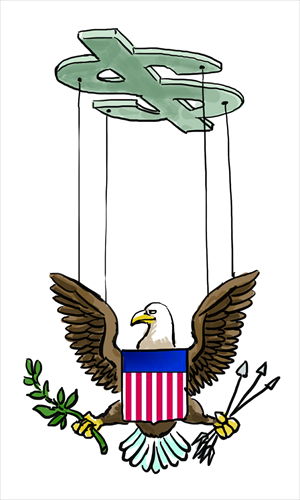HOME >> OP-ED
Monetarization of politics endangers US citizenry
By Norman Birnbaum Source:Global Times Published: 2014-4-14 23:13:01

Illustration: Liu Rui/GT
Enduring influence and power in the US rests with the courts and above all the Supreme Court, which has the right to declare entire ranges of law unconstitutional.
It was the Supreme Court which made the Civil War inevitable by declaring that slaves were neither citizens nor persons but property. It was the Supreme Court which later legitimated racial segregation, only to delegitimize it in 1954 and open the way for the civil rights revolution.
And it was the Supreme Court which first blocked and then, under extreme pressure, reversed itself and facilitated the New Deal projects of economic intervention and regulation as well as social insurance, which gave us the modern American state.
Ever since, the nominations of justices, each must be approved by a majority of the Senate after being named by the president, has been a political battlefield - often as important, if not more so, than congressional and even presidential elections.
The Republican Party's aim since the presidency of Ronald Reagan has been the dismantling, piece by piece, of the US welfare state. The government's powers to act on a national scale to enforce standards of economic and social equality, the rights of citizens as opposed to the rights of capital, are for most Republicans tyranny incarnate.
The present Supreme Court has a majority which is reliably Republican. That is why, in two recent decisions, it granted the wealthy and the powerful, either acting as individuals or through economic corporations and political organizations, nearly unlimited rights to spend money in elections.
The decisions were part of a larger Republican plan which includes canceling the civil rights protections which have given Afro-Americans, Latinos, the impoverished, access to voting without the legal or pseudo-legal obstacles. These obstacles have effectively denied political rights to one in 10 or even one in five potential voters.
With respect to political financing, the 2010 decision in a case termed Citizens United deemed unconstitutional restrictions on political expenditures by corporations, associations, unions.
In a recent case, the court declared that individuals could not be limited in the amount of money they contributed to political campaigns. One study has found that some 28 percent of political funding comes from 0.1 percent of the population.
One should consider the recent rise in spending in US elections. One estimate is that in 2000, somewhat more than $3 billion were spent on national elections, about $1.7 billion on congressional elections and about $1.4 billion on the presidential campaign.
By 2012, the total amount had doubled. $3.6 billion is the estimate for Congressional elections, and the presidential contest cost $2.6 billion. Considerable increases in expenditures have also been recorded for important elections for governorships, state legislatures and mayoral posts.
That, however, is only part of the story. For a very long time, wealthy individuals and the most varied assortment of organizations, from profit-making companies to ideological and political groupings, including churches and ethnic associations, have striven to set the agenda of public debate.
They have subsidized universities and centers of research, books, journals, newspapers, radio and television programs. They have formed and paid for organizations with names implying popular origins - devoted to the intense propagation of views on matters of policy ranging from education, environmental problems, healthcare provision, to infrastructural investment, transportation, and taxation.
Where they have not directly intervened in elections, they have influenced political discourse by implanting in the public mind ideas and stereotypes consonant with their interests, and these interests usually go unacknowledged.
A great many citizens, for instance, believe that the system of retirement pensions, Social Security, is at financial risk and that its funds will run out.
That is quite untrue, but has been assiduously claimed for years by bankers and business executives, and lesser entrepreneurs, seeking to reduce the costs of labor.
As a result of the two recent Supreme Court decisions, the deficiencies in the public's access to the raw materials of political decision, accurate images of the social world, are likely to increase.
In the US, the phrase "grass-roots democracy" once had wide resonance. It meant the local gathering of citizens determined to advance their interests - even, or above all, if they had to enter into conflict with powerful and remote elites.
Just as more and more of the countryside has been despoiled by relentless exploitation, the political grass roots in the US have given way to disorientation, privatization, and no small amount of anger.
The monetarization of US politics has engendered a citizenry deprived of the means of practicing citizenship. Many are subliminally aware that they are being lied to, in effect, derided. Many respond with rage, directed at those who - recall President Obama's strikingly low approval ratings - call on them to think for themselves.
The 2014 congressional elections, in November will provide a test of whether old-fashioned means of political persuasion, such as neighborhood activism, candidates unbound to wealthy backers, remnants of critical journalism, can still prevail in an electoral system increasingly undistinguishable from a market.
The author is professor emeritus of Georgetown University Law Center. opinion@globaltimes.com.cn
Posted in: Viewpoint